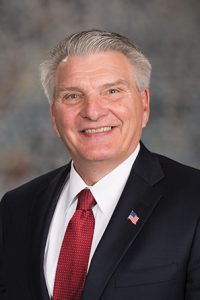Bill would change Medicaid rate calculation for nursing facilities
The Appropriations Committee heard testimony March 25 on a bill that seeks to help struggling nursing facilities in Nebraska.

LB403, introduced by Gering Sen. John Stinner, would prohibit the state Department of Health and Human Services from including application of the inflation factor when calculating Medicaid nursing facility rates beginning in fiscal year 2019-20.
“This would, in effect, require DHHS to use the amounts appropriated by the Legislature for computing future nursing facility rates,” Stinner said, adding that approximately $30 million over the last five years has been allocated for Medicaid reimbursement but not paid out under the current methodology.
Stinner said 16 nursing facilities closed in Nebraska between 2015 and 2018, and 22 have been placed under state receivership—the majority of them located in rural areas.
“It’s not a sustainable business model when a nursing facility is paid less than its costs to provide care,” Stinner said.
Heath Boddy, president and CEO of the Nebraska Health Care Association, testified in support of the bill. He said the inflation factor assumes that facility utilization will stay the same over a two-year period, but utilization has been declining consistently in rural areas.
“Without any change to this rate calculation formula, Medicaid’s inflation factor will continue to increase and put nursing facility sustainability in further jeopardy,” Boddy said.
Kari Wockenfuss, administrator of the Louisville Care Center, also testified in favor of LB403. She said that 76 percent of residents at the facility are Medicaid recipients, and the reimbursement rate for their care continues to decrease. The result, she said, is that the facility has lost $169,000 since Oct. 1.
“It’s a challenge to make ends meet when you’re serving such a high population of residents that are receiving Medicaid,” Wockenfuss said.
Jeremy Brunssen, deputy director of finance and program integrity at DHHS, opposed the bill. He said the department is working on a new rate methodology that would improve the funding situation.
Brunssen said the new methodology would set a base for all providers in the state rather than the current system in which some providers are being paid more than $80 more per day than others. The new methodology also would incentivize facilities to increase the number of Medicaid residents they serve and improve their overall quality of care, he said.
The committee took no immediate action on LB403.

